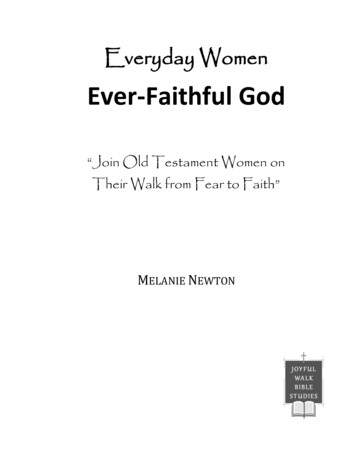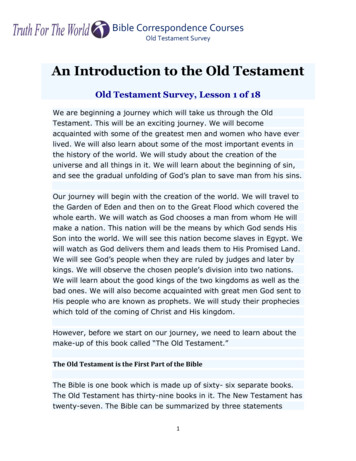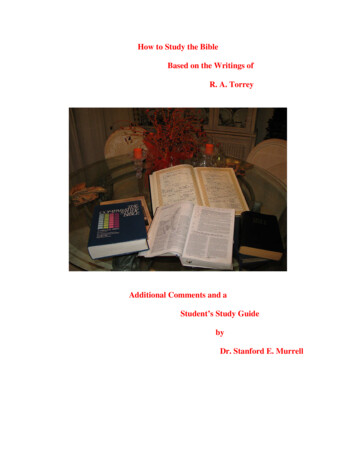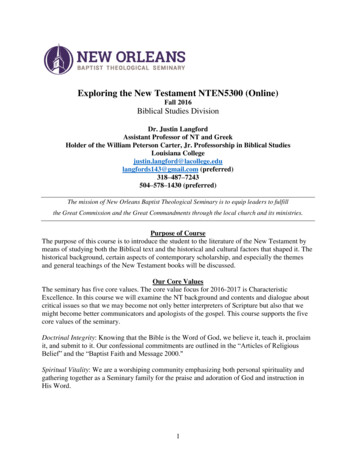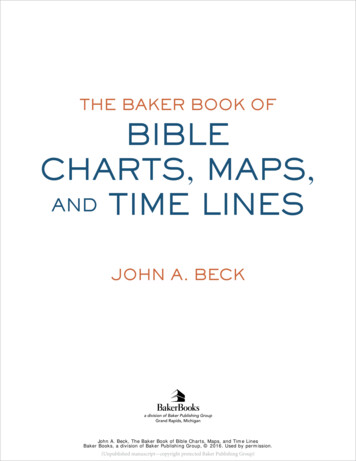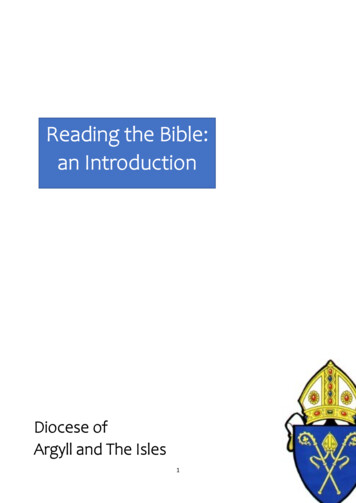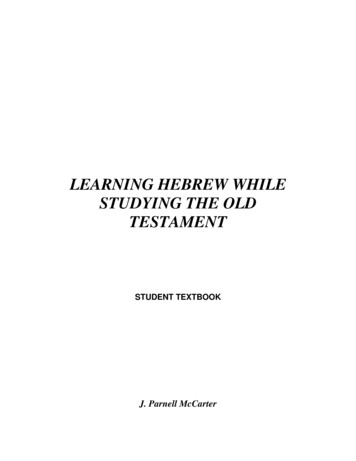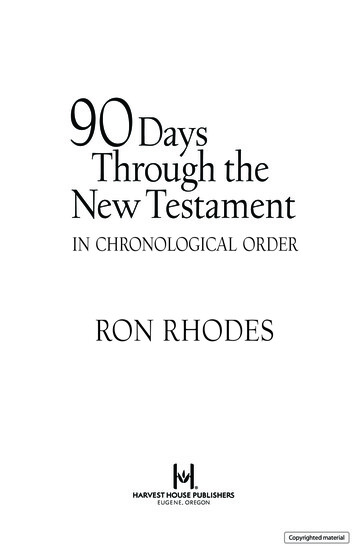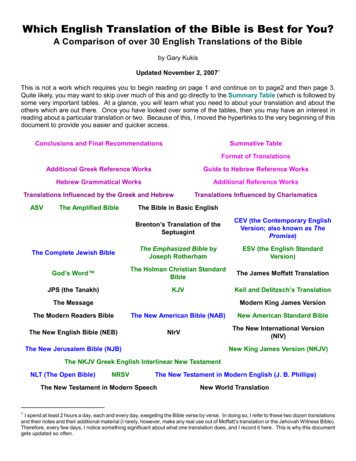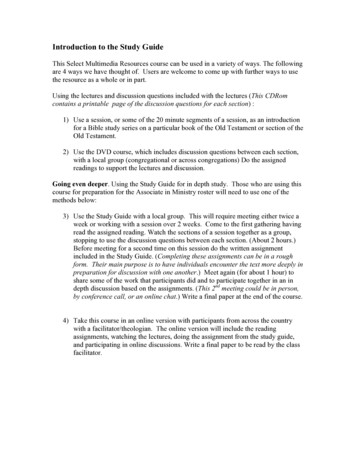
Transcription
Introduction to the Study GuideThis Select Multimedia Resources course can be used in a variety of ways. The followingare 4 ways we have thought of. Users are welcome to come up with further ways to usethe resource as a whole or in part.Using the lectures and discussion questions included with the lectures (This CDRomcontains a printable page of the discussion questions for each section) :1) Use a session, or some of the 20 minute segments of a session, as an introductionfor a Bible study series on a particular book of the Old Testament or section of theOld Testament.2) Use the DVD course, which includes discussion questions between each section,with a local group (congregational or across congregations) Do the assignedreadings to support the lectures and discussion.Going even deeper. Using the Study Guide for in depth study. Those who are using thiscourse for preparation for the Associate in Ministry roster will need to use one of themethods below:3) Use the Study Guide with a local group. This will require meeting either twice aweek or working with a session over 2 weeks. Come to the first gathering havingread the assigned reading. Watch the sections of a session together as a group,stopping to use the discussion questions between each section. (About 2 hours.)Before meeting for a second time on this session do the written assignmentincluded in the Study Guide. (Completing these assignments can be in a roughform. Their main purpose is to have individuals encounter the text more deeply inpreparation for discussion with one another.) Meet again (for about 1 hour) toshare some of the work that participants did and to participate together in an indepth discussion based on the assignments. (This 2nd meeting could be in person,by conference call, or an online chat.) Write a final paper at the end of the course.4) Take this course in an online version with participants from across the countrywith a facilitator/theologian. The online version will include the readingassignments, watching the lectures, doing the assignment from the study guide,and participating in online discussions. Write a final paper to be read by the classfacilitator.
Introducing the Old TestamentTextbook: Michael D. Coogan, The Old Testament. A Historical and LiteraryIntroduction to the Hebrew Scriptures. New York: Oxford University Press, 2006.Website: The Old Testament and the Ancient Near East(http://prophetess.lstc.edu/ rklein)1. Canon and ExegesisCanon, historical critical exegesis (and other methods), timeline of Old Testamenthistory, Old Testament or Hebrew Bible; BCE; relationship of Old Testament toJudaism, relationship of Old Testament to the New Testament, relationship of theOld Testament to the church today.Reading: Coogan, Appendix: The Canons of the Hebrew Bible/Old Testament545-549; Chronology 550-557; Glossary 560-565; SupplementaryKlein, “Reading the Bible as Lutherans in the Twenty-First Century.”(http://prophetess.lstc.edu/ rklein)2. The Primeval History—Genesis 1-11Reading: Coogan, Chapter 1 Creations, 3-20; Chapter 3 Primeval History, 31-42;Supplementary: Chapter 2 The Formation of the Pentateuch, 21-303. The Ancestral History—Sarah and AbrahamReading: Coogan, Chapter 5 The Ancestors of Israel, 63-84; Supplementary:Chapter 4 The Promised Land: Geography, History, and Ideology, 45-624. Exodus and the Decalogue; DeuteronomyReading: Coogan Chapter 6 Escape from Egypt 85-119; Chapter 11 The End ofthe Journey to the Promised Land, 173-1905. The Deuteronomistic History (especially the Book of Samuel)Reading: Coogan Chapter 12 Joshua and the Conquest of the Land, 191-193 only[The Deuteronomistic History]; Chapter 14 The Establishment of the Monarchy,231-247; Chapter 15 The Reign of David, 248-265;Supplementary: Chapter 16 The Reign of Solomon, 266-306; Klein “The SecretThings and the Things Revealed: Reactions to the Exile in the DeuteronomisticHistory” (http://prophetess.lstc.edu/ rklein/) first drop down menu underDeuteronomistic History.
6. Amos and Prophecy; the First Isaiah and the MessiahReading: Coogan, Chapter 18, The Northern Kingdom of Israel in the EighthCentury, 307-326; Chapter 19 The Kingdom of Judah in the Eighth and EarlySeventh Centuries BCE 327-3487. JeremiahReading: Coogan Chapter 21 The Fall of Jerusalem, 359-377.Klein “Saying Yes to Exile—and No! Reactions to the Exile in the Book ofJeremiah” (http://prophetess.lstc.edu/ rklein) first drop down menu underProphets and look at the listings under Jeremiah.8. The Exile, Second Isaiah, and the ServantReading: Coogan Chapter 22 After the Fall: Jews in Judah and Babylon, 381386 only; Chapter 23 Return from Exile, 401-416; Klein: “Yahweh Willing andAble.” (http://prophetess.lstc.edu/ rklein) first drop down menu under Prophetsand look under Second Isaiah.9. JobReading: Coogan Chapter 28 Dissidents and Lovers, 479-49810. PsalmsReading: Coogan Chapter 27 The Consolidation of Traditions 456-476
Introducing the Old TestamentTextbook: Michael D. Coogan, The Old Testament. A Historical and LiteraryIntroduction to the Hebrew Scriptures. New York: Oxford University Press, 2006.Website: The Old Testament and the Ancient Near East(http://prophetess.lstc.edu/ rklein)Lesson 1. Canon and Exegesis (Ralph W. Klein )Reading: Coogan, Appendix: The Canons of the Hebrew Bible/Old Testament545-549; Chronology 550-557; Glossary 560-565Supplementary: Klein, “Reading the Bible as Lutherans in the Twenty-FirstCentury.” http://prophetess.lstc.edu/ rklein/Doc9/metrochicago.docSection 1I.The Old Testament Canon (Tenak)A. Content of the Canon (Jews and Protestants; the significance of thedifferent order in these two canons)Pentateuch—Law—Instruction: (Genesis, Exodus, Leviticus, Numbers,Deuteronomy)Prophets: Former Prophets Joshua, Judges, Samuel, Kings;Latter Prophets: Isaiah, Jeremiah, Ezekiel, Twelve MinorProphetsWritings: Psalms, Job, Proverbs, Ruth, Song of Songs, Ecclesiastes,Lamentations, Esther, Daniel, Ezra, Nehemiah Chronicles Roman CatholicEastern OrthodoxLutherans and the canon.B. The Date of the Canon: 400 BCE; 200 BCE; 90 CEWhat we know and what we don’t knowC. The text of the Hebrew Bible: Masoretic Text, Septuagint, Dead Sea ScrollsQuestions for Discussion Reflection1. Reflect on the canonical lists on pp. 546-547 of Coogan. How are the lists thesame? How do they differ?2. Throughout the course, use the glossary on pp. 560-565 frequently. Create yourown list of new terms3. What is the significance of not having copies of the original Old Testament?
Section 2II.Old Testament or Hebrew Bible? B.C. or B.C.E.?Continuities and discontinuities with Jewish readingsWhat it meant and what it might meanIII.A Brief Overview of Old Testament HistoryA. Ancestral period 2000-1700B. Israel in Egypt ca. 1700-late 13th centuryC. Exodus and “Conquest” Late 13th/early 12th centuryD. The Period of the Judges 1150-1025E. The United Monarchy 1025-928F. The Divided Monarchy 928-586G. Israel in Babylonian Exile 586-539H. The Post-Exilic (Persian) Period 539-332I. The Hellenistic Period 332-63J. The Roman conquest 63 B.C. E.Questions for Discussion/Reflection1. Why should there be similarities in theology between Christians and Jews?2. Can stories be true if their history is unknown?3. Which period of Israelite history offered the greatest challenge to their faith?Section 3IV. V. How have people read the Scriptures over the ages?The four fold method in the Middle Ages: Literal, allegorical, tropological,and eschatologicalLuther’s approach to Scripture and Biblical AuthorityHow do we read the Bible today:The Historical Critical MethodNarratological and sociological methodsReading from social location (everyone has one; African American readings;feminist readings, etc.)Reading as believersThe Old Testament/Hebrew Bible and the New TestamentThe Bible of the earliest churchThe Pesher exegesis in the Dead Sea ScrollsPromise and fulfillmentWhat’s new and what’s old about ChristianityQuestions for Discussion/Reflection1. Reflect on the fact that our predecessors 500 and more years ago read the Bible ina much different way than we do, and yet came to similar faith conclusions.
2. In what ways should we read the Bible like any other book? In what ways do weread it unlike any other book?If exegetical methods of the New Testament or the Middle Ages seem archaic to us, howwill our successors 200 years from now view our methods of reading the Bible?Section 4VI.How and why do we read the Old Testament in and for the church todaySunday services; adult forums; personal study.Is Marcion still alive?Bible translations: NRSV, NIV, TEB, other.Study Bibles.VII. What we hope to do in this courseWhile this first lesson is mostly survey, in subsequent lessons we will alwayslook at one or more significant biblical texts and unpack its meaning.Textbook, Michael Coogan; websites The Old Testament and the Ancient nearEast; leaders Kathryn Schifferdecker, and Ralph W. KleinQuestions for Discussion/Reflection1. Write down two or three hopes or expectations as you begin this class and two orthree anxieties as you begin this class. Reflect on them later in the course andwhen the course is over.2. Why do you think the church needs the Old Testament?Written AssignmentWrite a two page essay in which you reflect on how the Bible has been read during thecourse of Christian history and your own past experience in reading and studying the OldTestament.
Lesson 2: The Primeval History Genesis 1-11 (Ralph W. Klein)Reading: Coogan, Chapter 1 Creations, 3-20; Chapter 3 Primeval History, 31-42.Supplementary: Chapter 2: The Formation of the Pentateuch, 21-30. Also supplementary:The Primeval Story by Barry Bandstra. Go to http://prophetess.lstc.edu/ rklein. On thefirst drop down menu, select Pentateuch, and then Genesis. Scroll down to Genesis 1-11where you will find this essay.Section 1 The Story of Creation in “P” and the Babylonian Creation StoryQuestions for discussion/reflection:1. Since we are God’s good creatures, and placed in charge of God’s creation, whatresponsibility should we exercise in our rule of the earth? Does our giftednesshave implications for things like art and music? Does our rulership make issueslike global warming and consevation top priorities?2. In what ways is our contemporary culture a challenge to our faith, just as theEnuma Elish was a challenge to the faith of Israel? How can we meet thechallenge of our culture?Section 2 The Second Creation Story in Genesis 2:4b and followingQuestion for discussion/reflection:If the world is a very divided place, as indeed it is, what might be God’s good news forthis bad situation?Section 3 The Biblical and Babylonian Flood StoriesQuestion for discussion/reflection:Are we prepared to live out our Christian life in an imperfect world with all its problems?Section 4 The Conclusions to the Flood Narrative Genesis 9:1-17 Genesis 9:18-27 The Primeval History and Real HistoryQuestions for discussion/reflection:
What is the relationship between science and the Bible? Between Primeval History andReal History?Written AssignmentThe last segment of the lecture talked about the interface between science and religion,and specifically between creation and evolution. Write an essay in which you reflect onwhat was said in the lecture on this question and give your own assessment about aChristian response to creation and evolution. (Approximately 2 pages double spaced.)
Lesson 3: Lecture on Sarah and Abraham (Ralph W. Klein)Reading: Coogan, Chapter 5 the Ancestors of Israel, 63-84. Supplementary: CooganChapter 4 The Promised Land: Geography, History, and Ideology. Also supplementaryby Ralph W. Klein, “The Yahwist Looks at Abraham.” http://prophetess.lstc.edu/ rklein/and look under Documents by RWK and Choose Selected Other Documents. The verylast item on this list is “The Yahwist Looks at Abraham.”Section 1 Go to the Land that I will show you Gen 12:1-3Gen 12:10-20 The Endangering of the Ancestress SarahQuestions for discussion/reflection:What are our options in our congregations or in our daily life to bring blessings to thenations?Extra credit: In addition to reading Gen 12:10-20, I would encourage you to read asimilar story in Gen 20:1-18. This story is told in quite a different way. How does Godreveal himself in Gen 12 and Gen 20? Was Sarah kept safe sexually in Gen 12? In Gen20? Did Abraham tell the truth about Sarah being his sister in Gen 12? In Gen 20?Abraham also received animals and servants in Genesis 20. How does the timing of thisgift in Gen 20 make a difference? What title is Abraham given in Gen 20? What is he todo in that capacity?Section 2 Genesis 15:1-6 Abraham and righteousnessGenesis 15:7-21 Yahweh invokes upon himself a curseGenesis 17:1-23 The Everlasting CovenantQuestions for discussion/reflection:1. Consider times when you like Abraham found it hard to believe in God. Whatpromises of God have been especially meaningful to you at such times?2. Secondly, is the everlasting covenant God made with Sarah and Abraham still valid forJews today?
Section 3 Abraham, Sarah, and HagarQuestions for discussion/reflection:1. Did Sarah and Abraham fail to trust the promise in the stories about Hagar, or didthey think that God would not carry out his promise without them doing their ownpart to help out?2. Why do you and I have so great difficulty accepting people who are seen as“other?”Section 4 The Birth of Isaac Gen 18:1-15; 21:1-7The Near Sacrifice of Isaac Genesis 22:1-14The Death and Burial of SarahConclusionQuestions for Discussion/reflection:1. Spend some time reflecting on the meaning of the story of the sacrifice of Isaac.Read it aloud to catch its power and its beauty.2. Consider and reflect upon this modern translation of the Lord’s Prayer: Save usfrom the time of trial.Written AssignmentThe lecture discussed Gen 12:10-20, but a similar story appears in Gen 20:1-18 where itis told with quite different emphases and possibly by a different writer. Write an essaythat addresses the following questions: How does God reveal himself in Gen 12 and Gen20? Was Sarah kept safe sexually in Gen 12? In Gen 20? Did Abraham tell the truthabout Sarah being his sister in Gen 12? In Gen 20? Abraham also received animals andservants in Genesis 20. How does the timing of this gift in Gen 20 make a difference?What title is Abraham given in Gen 20? What is he to do in that capacity?
Lesson 4: Exodus and the Decalogue; Deuteronomy (Kathryn Schifferdecker)Reading: Exodus 1-4; 12-15; 20; Deuteronomy 5-6, 34Coogan, Chapter 6 “Escape from Egypt,” pp. 85-119; chapter 11 “The End of theJourney to the Promised Land,” pp. 173-190For further study: Resources at Prof. Klein’s website:(http://prophetess.lstc.edu/ rklein). Look under “Pentateuch” and then “Exodus” and“Deuteronomy” for these resources.Terence Fretheim, The Pentateuch (Abingdon Press, 1996)Jon Levenson, Sinai and Zion (Harper Collins, 1985)Section 1I. Introduction to the PentateuchII. Exodus 1-15Questions for Discussion/Reflection:1. What images come to your mind when you think about the story of the Exodus?Do these images come from Sunday School, movies, Bible studies?2. What moves you in this story of the Exodus? What troubles you?3. What do you know of the rest of the book of Exodus, after the miracle at the RedSea?Section 2III. Exodus 16-40IV. DeuteronomyQuestions for Discussion/Reflection:1. The Israelites are given freedom in the Exodus. Is this freedom only a freedomfrom something, or is it also freedom for something?2. How have you understood law in the Old Testament? Important? Outdated?Boring?3. Do you understand the Sinai covenant in Exodus as a love relationship, as JonLevenson argues? What can we learn as Christians from this Jewishunderstanding of Torah?1
Section 3V. The Ten Commandments or DecalogueVI. Conclusion Law as gift The end of the Pentateuch and the death of MosesQuestions for Reflection/Discussion:1. What role do (or should) the Ten Commandments have in the life of the church?2. In what ways might the Law be understood as a gift?3. In what ways have the stories of Exodus and Deuteronomy (the stories of theExodus, Sinai, and the Promised Land) shaped your own understanding of God?Of faith?Written Assignment: Write a two-page essay on one major theme you’ve noticed inyour study of the Pentateuch (for example: covenant, law, liberation, God’s call, God’sfaithfulness, etc.). How does that theme from the Pentateuch resonate in your own lifeand ministry?2
Lesson 5: The Deuteronomistic History: Joshua, Judges, Samuel and Kings(Ralph W. Klein)Reading: Coogan Chapter 12 Joshua and the Conquest of the Land, 191-193 only[The Deuteronomistic History]; Chapter 14 The Establishment of the Monarchy,231-247; Chapter 15 The Reign of David, 248-265;Supplementary: Chapter 16 The Reign of Solomon, 266-306; Klein “The SecretThings and the Things Revealed: Reactions to the Exile in the DeuteronomisticHistory” (http://prophetess.lstc.edu/ rklein/) first drop down menu under DTR(Joshua-Kings) and then scroll down to Introduction to the DeuteronomisticHistory and this title is the seventh starred item.Section 1 Introduction to the Deuteronomistic HistoryQuestions for discussion/reflection:1. What are your reflections on the instructor’s interpretation of the Battle ofQarqar?2. What do you think about understanding Joshua-2 Kings as the DeuteronomisticHistory?Section 2 The book of JoshuaThe book of JudgesThe books of Samuel1 Samuel 12 Samuel’s Farewell SermonQuestions for discussion/reflection:The Deuteronomistic History is based on the doctrine of retribution: good deeds havegood consequences, bad deeds have bad consequences. How is this doctrine helpful?How is it problematical?Section 3 2 Samuel 7 The Oracle of Nathan1 and 2 Kings1 Kings 8: Solomon’s Prayer at the dedication of the templeThe Division of the KingdomThe Fall of the Two KingdomsQuestions for discussion/reflection:
1. What promises in the Bible give you hope when you face troubling times?2. In what old and new ways does Jesus fulfill the promises made to David?Written AssignmentOn the basis of 2 Kgs 17:7-23, write an essay that describes how this sermon interpretsthe fall of the Northern Kingdom.
Lesson 6. The Prophets: Amos and IsaiahAmos and Prophecy; the First Isaiah and the Messiah (Ralph W. Klein)Reading: Coogan, Chapter 18, The Northern Kingdom of Israel in the EighthCentury, 307-326; Chapter 19 The Kingdom of Judah in the Eighth and Early SeventhCenturies BCE 327-348Website: The Old Testament and the Ancient Near Easthttp://prophetess.lstc.edu/ rklein. Look in the first drop down menu under the wordProphets. Click the reference to Isaiah at the top of the page or to the Twelve MinorProphets, where you will find information on Amos.Section 1I.Introduction to the ProphetsII.AmosA. Turning the world upside downAmos 3:1-2 and electionAmos 5:18-20 The day of YahwehAmos 9:7 Exodus—Everybody’s had an ExodusB. The Compulsion to ProphesyAmos 3:3-8Questions for Discussion/Reflection1. Why are we so shy about bearing witness to our faith or correcting someone who isbehaving in an inappropriate manner? Why do we have to be urged to doevangelism?2. Consider this as well: Is the compulsion of Amos to speak also a dangerous thing?Is he somewhat of a fanatic?Section 2C. The Visions of AmosAmos 7:1-3, 4-6, 7-8; 8:1-2; 9:1-4Questions for Discussion/Reflection1. Did Amos over do it in denouncing the people?2. Why does he not make a distinction between the righteous and the sinners?
Section 3D. The Limits to God’s PatienceAmos 4:6-12E. Liturgy and LifeAmos 5:21-24F. The Incident with AmaziahAmos 7:10-17G. The Last Words of AmosAmos 9:11-15Questions for Discussion/Reflection1. In our work for social justice, what do we think about the people whose actionswe criticize? Do we think of ourselves as superior to them?2. Is God’s final answer always yes?Section 4III.Isaiah--and the MessiahIsa 7:9 a call to faithIsa 30:15-16 critique of military alliancesIsa 6:1-8 The call of the prophetA. The basis of the messianic hope 2 Sam 7:1-16B. The child with the wondrous name Isa 9:1-7: Wonderful Counselor; Mighty God;Everlasting Father; Prince of Peace orThe Mighty God is Planning a WonderThe Everlasting Father is Planning to give an Officer of PeaceC. A shoot from the stump of Jesse Isa 11:1-9D. The Old Testament Messiah and the New Testament ChristQuestions for Discussion/Reflection:1. How does the description of the Old Testament Messiah in this lecture help us tounderstand the reactions of Jews then and now to the message of Jesus?2. How might you or your congregation implement signs of the messianic age?Written assignment: On the basis of the exegesis of the two messianic passages inIsaiah, read carefully Isaiah 11:10-16. Write a short essay (about two pages) in whichyou describe what is said in these verses about the messiah or about the messianicage.
Lesson 7. Jeremiah (Ralph W. Klein)Reading: Coogan Chapter 21 The Fall of Jerusalem, 359-377.Klein “Saying Yes to Exile—and No! Reactions to the Exile in the Book ofJeremiah” (http://prophetess.lstc.edu/ rklein) Look under the first drop downmenu under Prophets and then click on the hyperlink for Jeremiah. This essay willbe found there.Section 1I. Introduction to the BookBiography and History of his timesThe Makeup of the Book of JeremiahA words, B words, C wordsWords of Jeremiah and the Deuteronomistic redactionThe Hebrew text of Jeremiah and the Greek translation called the Septuagint(LXX)II. The Call of Jeremiah 1:4-10Questions for discussion/reflection1. In what ways have you been called by God? How did you experience that call?2. How satisfying was Yahweh’s response to the anxieties expressed by Jeremiah?3. Can you think of other examples in the Bible when God’s final answer was Yes?Section 2III. Symbolic actions: 16:1-4; 18:1-11; 19:1-2, 10-13; 24:1-10; 27:2-28:17; 32:6-15;Questions for discussion/reflection1. Do you see any similarity between the symbolic actions of Jeremiah and the parablesof Jesus?2. Some scholars have proposed that Jeremiah used symbolic acts as a dramatic way toemphasize his message and to try to convince people of his reliability. How would youhave decided between Jeremiah and Hananiah?3. Faith is trusting in Yahweh, all evidence to the contrary notwithstanding. Do youagree? Why?Section 3III. Jeremiah’s Confessions 20:7-18IV. Jeremiah’s Temple Sermon Jeremiah 7 and 26
V. Jeremiah’s Letters to the exiles 29:1-9; 51:59-64V. The Biography of Jeremiah Jeremiah 36-45VI. Jeremiah’s Promise of a Coming King (Messiah) Jer 23:5-6; 33:14-16VII. The New Covenant 31:31-34Questions for discussion/reflection1. What continuities or discontinuities do you see between Jer 23:5-6 and its fulfillmentin Jesus?2. How might the translation “renewed covenant” be beneficial in interfaith discussions?Written assignment: Write a two page essay reflecting on the double message ofJeremiah: Saying Yes to Exile—and No!
Lesson 8. The Exile, Second Isaiah, and the Servant (Ralph W. Klein)Reading: Coogan Chapter 22 After the Fall: Jews in Judah and Babylon, 381386 only; Chapter 23 Return from Exile, 401-416; Klein: “Yahweh Willing andAble.” (http://prophetess.lstc.edu/ rklein) Look in first drop down menu underProphets and look under Second Isaiah where you will find this essay.Section 1Responses to the exile in The Deuteronomistic History Lamentations The Priestly writer in the Pentateuch EzekielAnd in Second Isaiah (Isaiah 40-55)I.The reasons for identifying a Second IsaiahQuestions for Discussion/Reflection1. Exile was a time of great loss and of threats to the faith. Discuss which of theselosses would have been most difficult for you.2. Note that several biblical authors offered responses to Israel’s exile. Which ofthem seems most attractive to you? What do you think of the canon containing suchdisparate, almost contradictory, responses?Section 2II.The call of Second Isaiah Isa 40:1-8III.The return of the Divine Warrior Isa 40:9-11IV.The Conclusion of Second Isaiah Isa 55:10-13V.Creation and Mythology Isa 51:9-11VI.The Messenger’s Beautiful Feet Isa 52:7-10VII.A Disputation Isa 44:24-45:13; 40:12-31Questions for Discussion/Reflection1. Why was there resistance to Second Isaiah’s message?
2. Do we see God’s hand at work in those who are not Christians, just as SecondIsaiah found God’s anointed one to be Cyrus the Persian?Section 3VIII.A Lawsuit against the gods 41:21-29. See also 41:1-5; 43:8-13; 44:6-8;45:18-25IX.Oracles of Salvation 41:8-13, 14-16; 43:1-4; 5-7; 44:1-5; 54:4-6X.The Servant of Yahweh 42:1-4; 49;1-6; 50:4-9; 52:13-53:12Questions for discussion/reflection1. What role do the servant poems play in Second Isaiah’s overall response to the exile?2. In what ways can you identify with ancient Israel the servant? With Jesus as servant.Written assignment:Write a two page essay in which you discuss the Oracles of Salvation not treated in thisclass: 43:1-4, 5-7; 44:1-5; 54:4-6. What is comforting to you about these oracles? Whatcauses you difficulty?
Lesson 9: The Book of Job (Kathryn Schifferdecker)Reading: Job 1-3, 18-19, 29-31, 38-42Coogan, Chapter 28 “Dissidents and Lovers,” pp. 479-498For further study: Resources at Prof. Klein’s website:(http://prophetess.lstc.edu/ rklein). Look under “Writings” and then “Job” for theseresources.J. Gerald Janzen, Job (John Knox Press, 1985)Ellen Davis, Getting Involved with God: Rediscovering the Old Testament (Cowley,2001)Section 1I. Background and Structure Outline of the book Authorship and DateII. Prologue (Job 1-2)Questions for Discussion/Reflection:1. What do you know about the story of Job? Can you think of any parallels to thestory in literature or movies?2. What is your initial reaction to the prologue? Would you agree with VirginiaWoolf’s statement: “I read the book of Job last night. I don’t think God comes outof it well”?3. How is your answer to the previous question influenced by the knowledge that thebook of Job is not recording historical events?Section 2III. Poetic Dialogue (Job 3-37)Questions for Discussion/Reflection:1. What sorts of things do people say to those who are going through greatsuffering? Which are helpful? Which are unhelpful?2. What is the value of speaking to God and not just about God?3. Have you ever felt like Job? Have you lamented to God? What is the value oflament? (See Ps. 13 for another example of lament.)Section 3IV. The Divine Speeches (Job 38-41) The theme of procreation The place of humanity in creation God’s ordering of creation1
Questions for Discussion/Reflection:1. What is your initial reaction to the divine speeches in the book of Job? Is Godsimply putting Job in his place, or is something else going on?2. Job’s focus is taken off himself in the divine speeches, and he is made to considerthings and creatures outside of his social world. Is such an approach helpful, doyou think, to a person who is suffering? Why or why not?3. How would you compare the view of humanity in the divine speeches to theviews of humanity elsewhere in the Bible? (Look at Psalm 8, or Gen. 1:26-31.)Section 4V. The Epilogue (Job 42)VI. ConclusionsQuestions for Discussion/Reflection:1. What are your reactions to this interpretation of Job? Does Job’s story reflect yourown experience in any way, or the experience of someone you know?2. How do we as Christians talk about suffering, given our claim that God in Christhas entered into our suffering on the cross?3. How might the book of Job be used in pastoral care situations?Written Assignment: Write a two-page essay about the divine speeches at the end of Job(chapters 38-41). What is your reaction to these speeches? What do you find comfortingor helpful? What disturbs you?2
Lesson 10: Psalms (Kathryn Schifferdecker)Reading: Psalms 1, 2, 13, 22, 104, 122, 136, 137, 148, 150Coogan, chapter 27, “The Consolidation of Traditions,” pp. 456-476For further study: Resources at Prof. Klein’s website: (http://prophetess.lstc.edu/ rklein).Look under “Writings” and then “Psalms” for these resources.Eugene Peterson, Answering God: The Psalms as Tools for Prayer (HarperCollins, 1991)James Limburg, Psalms (Westminster John Knox, 2000)Section 1I. Introduction Authorship and date King David and the Psalms The five “books” of Psalms Beginning and ending (Psalms 1-2 and 146-150)Questions for Discussion/Reflection:1. What is your favorite psalm? Why is it your favorite?2. How are the Psalms used in your church? Can you think of specific times in the liturgy orin the church year when a psalm is used? (Psalm 22, for instance, is often read on GoodFriday.)3. Talk about the role of music in worship. How does music add to the worship experiencefor you?Section 2II. Psalms as LiturgyIII. Lament PsalmsQuestions for Discussion/Reflection:1. Read the first few verses of Ps. 22. Jesus prayed this prayer from the cross. Have you everfelt like the psalmist? Have you ever prayed a prayer like this, or known someone whohas?2. How might the church claim (or re-claim) lament in worship? In pastoral care?3. For an example of how lament may have been used in ancient Israel, read 1 Samuel 1:9-18(individual lament) and 2 Chronicles 20:3-17 (communal lament). In both instances, apriest or prophet offers a promise of deliverance. Scholars believe such promises werespoken in the liturgy in answer to laments, which resulted in the vow to praise at the endof most laments.4. How would you answer someone who asked, “Is it all right to be angry with God?”1
Section 3IV. Imprecatory PsalmsV. Creation PsalmsQuestions for Discussion/Reflection:1. Have you ever encountered the imprecatory psalms before? Read Psalm 58. Can youimagine any time in your life when this psalm might be useful?2. What does it mean to hand over our “enemies” into God’s hands?3. Read Psalm 8. Along with Genesis 1-3, the psalmist here asserts that human beings have“dominion” over the rest of cr
Judaism, relationship of Old Testament to the New Testament, relationship of the Old Testament to the church today. Reading: Coogan, Appendix: The Canons of the Hebrew Bible/Old Testament 545-549; Chronology 550-557; Glossary 560-565; Supplementary Klein, “Reading the
